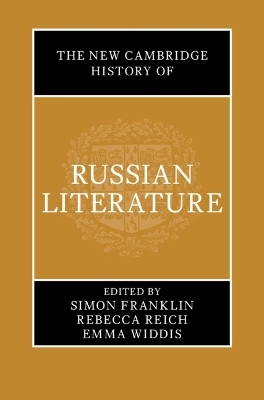
The New Cambridge History of Russian Literature
Cambridge University Press (Verlag)
978-1-108-49348-2 (ISBN)
This is the essential new guide to Russian literature, combining authority and innovation in coverage ranging from medieval manuscripts to the internet and social media. With contributions from thirty-four world-leading scholars, it offers a fresh approach to literary history, not as one integral narrative but as multiple parallel histories. Each of its four strands tells a story of Russian literature according to a defined criterion: Movements, Mechanisms, Forms and Heroes. At the same time, six clusters of shorter themed essays suggest additional perspectives and criteria for further study and research. In dialogue, these histories invite a multiplicity of readings, both within and across the narrative strands. In an age of shifting perspectives on Russia, and on national literatures more widely, this open but easily navigable volume enables readers to engage with both traditional literary concerns and radical re-conceptualisations of Russian history and culture.
Simon Franklin is Emeritus Professor of Slavonic Studies at the University of Cambridge. His recent books include The Russian Graphosphere, 1450–1850 (Cambridge University Press, 2019), winner of the ASEEES/USC Prize for an outstanding monograph in literary and cultural studies, and Information and Empire: Mechanisms of Communication in Russia, 1600–1850 (coedited with Katherine Bowers, 2017). Rebecca Reich is Associate Professor of Russian Literature and Culture at the University of Cambridge. She is the author of State of Madness: Psychiatry, Literature, and Dissent After Stalin (2018), which won the prize for Best First Book from the American Association of Teachers of Slavic and East European Languages. She is also Consultant Editor for Russia and East-Central Europe at the Times Literary Supplement. Emma Widdis is Professor of Slavonic Studies at the University of Cambridge. Her publications include Socialist Senses: Film, Feeling and the Soviet Subject (2017), National Identity in Russian Culture (coedited with Simon Franklin, Cambridge University Press, 2014) and Visions of a New Land (2013).
Introduction Simon Franklin, Rebecca Reich and Emma Widdis; History 1: Movements; 1.1 The Age of Devotion Simon Franklin; 1.2 The Baroque Age Simon Franklin; 1.3 The Age of Classicism Marcus C. Levitt; 1.4 Sentimentalism and Romanticism Ilya Vinitsky; 1.5 The Natural School and Realism Alexey Vdovin; 1.6 Symbolism and the Fin de Siècle Yuri Corrigan; 1.7 Modernism and the Avant-Garde Connor Doak; 1.8 Socialist Realism Evgeny Dobrenko; 1.9 Postmodernism Ilya Kukulin; 1.10 Contemporary Movements Marijeta Bozovic; Boxes 1: Close Readings; 1.1 A Nineteenth-Century Verse Form: The Onegin Stanza Michael Wachtel; 1.2 A Nineteenth-Century Prose Form: A Hero of Our Time William Mills Todd III; 1.3 A Twentieth-Century Verse Form: Maiakovskii's lesenka Isobel Palmer; 1.4 A Micro-Story: 'Blue Notebook No. 10' Ilya Kukulin; 1.5 An Internet Form: The Meme Ellen Rutten; Boxes 2: Genres; 2.1 Povest' Lyudmila Parts; 2.2 Satire Evgeny Dobrenko; 2.3 Travelogue Lyudmila Parts; 2.4 Children's Literature Connor Doak; 2.5 Civic Poetry Ilya Kukulin; History 2: Mechanisms; 2.1 The Monastery Simon Franklin; 2.2 The Court Alexei Evstratov; 2.3 The Salon and the Circle Ilya Vinitsky; 2.4 The Thick Journal William Mills Todd III; 2.5 The Publisher William Mills Todd III; 2.6 Queerness Evgenii Bershtein; 2.7 The Censor Polly Jones; 2.8 The Voice Stephen Lovell; 2.9 The Self-Publisher Josephine von Zitzewitz; 2.10 The Market Bradley A. Gorski; 2.11 The Internet Marijeta Bozovic; 2.12 Empire Vitaly Chernetsky; Boxes 3: Places; 3.1 The Camp Polly Jones; 3.2 The Front Alexei Evstratov; 3.3 St Petersburg Josephine von Zitzewitz; 3.4 The Village Alexey Vdovin; 3.5 The Apartment Stephen Lovell; Boxes 4: Narrative Voices; 4.1 The Medieval First-Person Singular Simon Franklin; 4.2 The Unreliable Narrator Julie Curtis; 4.3 Skaz Jessica Merrill; 4.4 The Omniscient Narrator William Mills Todd III; 4.5 The Collective Voice Bradley A. Gorski; History 3: Forms; 3.1 Forms before Genres Simon Franklin; 3.2 Folk Genres Jessica Merrill; 3.3 Verse I Michael Wachtel; 3.4 Drama I Kirill Zubkov; 3.5 The Novel I Anna A. Berman; 3.6 The Short Story Lyudmila Parts; 3.7 Drama II Julie Curtis; 3.8 Verse II Isobel Palmer; 3.9 The Novel II Evgeny Dobrenko; 3.10 Self-Writing Emily Van Buskirk; 3.11 (Plat)forms after Genres Ellen Rutten; Boxes 5: Critical Frames; 5.1 Vissarion Belinskii Kirill Zubkov; 5.2 Viktor Shklovskii Emily Van Buskirk; 5.3 Lev Trotskii Connor Doak; 5.4 Mikhail Bakhtin Marijeta Bozovic; 5.5 Iurii Lotman Alexei Evstratov; Boxes 6: Literature beyond Literature; 6.1 The Igor Myth Simon Franklin; 6.2 Literature in Art Isobel Palmer; 6.3 Literature in Music Anna A. Berman; 6.4 Literature in Film Bradley A. Gorski; 6.5 The Pushkin Myth William Mills Todd III; History 4: Heroes; 4.1 The Saint Sergey Ivanov; 4.2 The Ruler Tatiana Smoliarova; 4.3 The Lowly Civil Servant Cathy Popkin; 4.4 The Peasant Alexey Vdovin; 4.5 The Intelligent Konstantine Klioutchkine; 4.6 The Russian Woman Anna A. Berman; 4.7 The New Person Emma Widdis; 4.8 The Non-Russian Michael Kunichika; 4.9 The Madman Rebecca Reich; 4.10 The Émigré Lisa Ryoko Wakamiya.
| Erscheint lt. Verlag | 12.12.2024 |
|---|---|
| Zusatzinfo | Worked examples or Exercises |
| Verlagsort | Cambridge |
| Sprache | englisch |
| Themenwelt | Geisteswissenschaften ► Sprach- / Literaturwissenschaft ► Anglistik / Amerikanistik |
| Geisteswissenschaften ► Sprach- / Literaturwissenschaft ► Literaturwissenschaft | |
| ISBN-10 | 1-108-49348-3 / 1108493483 |
| ISBN-13 | 978-1-108-49348-2 / 9781108493482 |
| Zustand | Neuware |
| Informationen gemäß Produktsicherheitsverordnung (GPSR) | |
| Haben Sie eine Frage zum Produkt? |
aus dem Bereich


